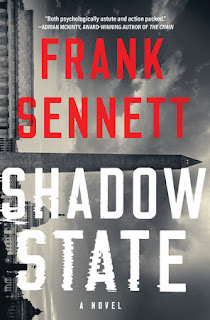 The End of Ordinary. His short fiction has appeared in venues ranging from the newsletter of an Italian sausage company to Escape Pod, Analog, and Fireside Fiction. He lives in upstate New York in a cabin in the woods (not that Cabin in the Woods) with his wife, a variable number of daughters, and an adorably mopey dog named Max, where he writes—mostly fiction, occasionally fact—under the watchful eyes of a giant woodpecker and a rotating cast of barred owls. In his free time, he enjoys cancer research, teaching quantum physics to sullen graduate students, and whittling.
The End of Ordinary. His short fiction has appeared in venues ranging from the newsletter of an Italian sausage company to Escape Pod, Analog, and Fireside Fiction. He lives in upstate New York in a cabin in the woods (not that Cabin in the Woods) with his wife, a variable number of daughters, and an adorably mopey dog named Max, where he writes—mostly fiction, occasionally fact—under the watchful eyes of a giant woodpecker and a rotating cast of barred owls. In his free time, he enjoys cancer research, teaching quantum physics to sullen graduate students, and whittling.
Ashton's new novel is Antimatter Blues.
Recently I asked the author about what he was reading. Ashton's reply:
I’m currently working my way through Children of Memory, the third installment in Adrian Tchaikovsky’s Children of Time series. The thing I love about Tchaikovsky’s work in general, and about these books in particular, is that he’s able to put together compelling adventures filled with clearly drawn and engaging characters, while simultaneously twisting his readers’ brains into knotsVisit Edward Ashton's website.exploring deep questions about the nature of sentience and what it might mean to different types of minds.
It’s distressingly common in science fiction to see alien intelligences portrayed as more or less humans with too few eyeballs or too many limbs. Tchaikovsky’s genius is to present us with creatures who are almost familiar—uplifted jumping spiders (Children of Time) or octopuses (Children of Ruin) or ravens (Children of Memory)—and then show us how despite being our cousins, each of these would see the world in completely unique and different ways, both from us and from one another. Bizarrely, the one truly alien intelligence in this series, introduced first in Children of Ruin, turns out in many ways to be the most like us. The implications of this are left as an exercise for the reader.
Exploring all of Adrian Tchaikovsky’s oeuvre is the work of a lifetime. He’s one of the very few authors I know of who manage to simultaneously produce high-quality work and to seemingly write it faster than I’m able to read it. If you’d like to dive in and see what he’s about, though, you could do a lot worse than starting with this series.
The Page 69 Test: Mickey7.
Q&A with Edward Ashton.
The Page 69 Test: Antimatter Blues.
--Marshal Zeringue






















